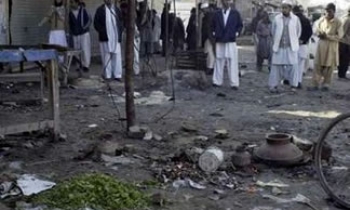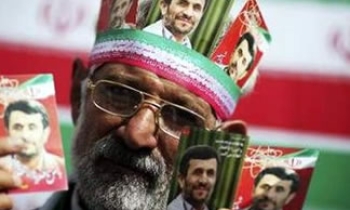KABUL (Reuters) - Afghan police killed four protesters on Tuesday in some of the worst violence to erupt over satirical cartoons of the Prophet Mohammad which have provoked a deepening crisis between Europe and the Muslim world.
Fresh protests erupted in the Middle East, Asia and Africa on Tuesday over the cartoons as leaders urged restraint and struggled to contain the protests, some of which in recent days turned from peaceful to volatile and bloody.
In Iran, locked in a nuclear stand-off with the West and which has cut trade ties with Denmark where the cartoons were first published, a crowd pelted the Danish embassy in Tehran with petrol bombs and stones for a second day.
After rioters set Danish missions ablaze in Syria and Lebanon at the weekend, the European Union presidency issued a strongly-worded warning to 19 countries across the Middle East that they are obliged to protect EU missions.
Danish Foreign Minister Per Stig Moeller called his Iranian counterpart "and demanded in clear terms that Iran does all it can to protect the embassy and Danish lives", a spokesman said.
Depicting the Prophet is prohibited by Islam but moderate Muslims, while condemning the cartoons, have expressed fears radicals are hijacking the affair which has developed into a clash over press freedom and religious respect.
Militants in Iraq have called for the seizure and killing of Danes and the boycott of Danish goods over the cartoons, one of which depicts Mohammad wearing a turban resembling a bomb with a fizzing fuse. In London, there were placards demanding the beheading of those who insulted Islam.
In a new twist, Iran's best-selling newspaper on Tuesday launched a competition to find the best Holocaust cartoon.
Denmark said on Tuesday that the violent protests raised concerns for the safety of its troops in Iraq and Afghanistan but that it had no plans to withdraw them.
British troops were ordered to the Afghan town of Maymana after crowds attacked a NATO base of Norwegian troops with guns and grenades and police opened fire bringing the protest death toll in the Middle East and Asia to nine.
F-16 warplanes flew overhead in a show of force while the Norwegians fired tear gas, rubber bullets and warning shots, managing to restore order by early evening. Norway was the second country to publish the cartoons.
Across the border from Afghanistan, more than 10,000 marched in Pakistan against the caricatures.
PROTESTS SPREAD FURTHER
Echoing calls for calm by leaders, U.N. Secretary-General Kofi Annan said: "I urge all who have authority or influence in different communities ... to engage in dialogue and build a true alliance of civilizations, founded on mutual respect."
But further protests erupted on Tuesday in Egypt, Yemen, Djibouti, Gaza and Azerbaijan, while Croatia became the latest country where a newspaper printed the cartoons.
At least 10,000 people marched in the Bangladeshi capital and tens of thousands turned out in Niger's capital Niamey in sub-Saharan Africa to vent their anger about the cartoons.
The cartoons have appeared in papers in Australia, Bulgaria, Denmark, France, Fiji, Germany, Hungary, Italy, Japan, Jordan, Malaysia, the Netherlands, New Zealand, Norway, Poland, South Africa, Spain, Switzerland, United States, Ukraine and Yemen.
Iran, which has withdrawn its ambassador from Denmark, said the cartoons had "launched an anti-Islamic and Islamophobic current which will be answered".
Moderate Muslim groups have issued statements condemning violent protests and calling for calm in order to distance themselves from radicals who they say have an agenda.
In an editorial, Saudi Arabia's Okaz newspaper rejected violence:
"The use of violence, spreading chaos and destroying facilities ... only distorts Islam's image, especially after our enemies have tried to label us with so many accusations."
Along with other European newspapers, Germany's top-selling Bild newspaper on Tuesday examined the background to the crisis under the headline: "Should we fear Islam?".
In a commentary, Bild writer Rafael Seligmann said Islam was a tolerant religion and the crisis was being exploited by extremists in the Middle East.
Denmark's Jyllands-Posten daily has apologised for the cartoons published last September but the Danish government has refused to apologise saying it is the paper's responsibility.
With diplomatic efforts accelerating, German junior Foreign Minister Gernot Erler urged "those who can help de-escalate the situation to come together and to avoid any steps that could further inflame this conflict, which can come dangerously close to a sort of clash of cultures."









